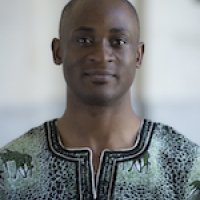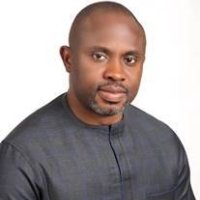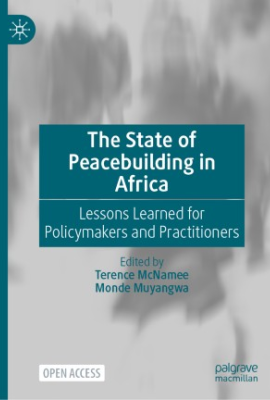The State of Peacebuilding in Africa: Lessons Learned for Policymakers and Practitioners
On March 16, 2021, the Wilson Center Africa Program hosted a book launch for The State of Peacebuilding in Africa: Lessons Learned for Policymakers and Practitioners, edited by Dr. Terence McNamee and Dr. Monde Muyangwa. The event featured Ms. Andrea Johnson, Program Officer, Higher Education and Research in Africa and Peacebuilding in Africa, Carnegie Corporation of New York and six book contributors, Dr. Paul D. Williams, Professor of International Affairs and, Associate Director, M.A. Security Policy Studies Program, The George Washington University; Dr. Fritz Nganje, Associate Professor of International Relations, University of Johannesburg; Dr. Chukwuemeka B. Eze, Executive Director, West Africa Network for Peacebuilding (WANEP); Ms. Lisa Sharland, Deputy Director of Defence, Strategy & National Security and, Head of the International Program, Australian Strategic Policy Institute (ASPI); Dr. Franklin Oduro, Resident Program Director for Elections, Ethiopia Office, National Democratic Institute for International Affairs (NDI), and; Dr. Phil Clark, Professor of International Politics, SOAS University of London. The speakers discussed the book's findings and provided recommendations for achieving a more sustainable peace in Africa. Dr. Terence McNamee, Global Fellow, Wilson Center Africa Program, moderated the event, which was attended by over 185 people including U.S., African, and international policymakers, practitioners, experts, and other stakeholders.
Dr. Muyangwa opened the event by discussing the Southern Voices Network for Peacebuilding (SVNP), a Pan-African network of African policy, research, and academic organizations that work with the Wilson Center Africa Program to bring African knowledge, analyses, and perspectives to inform policy on peacebuilding in Africa. The State of Peacebuilding in Africa builds on the research and activities of the SVNP and looks back at 30 years of peacebuilding in Africa to highlights key lessons learned and implications for policymakers
Ms. Johnson spoke to the Carnegie Corporation’s continued support of the SVNP and its commitment to peacebuilding in Africa. The Carnegie Corporation’s mission is to advance and diffuse knowledge and understanding, and its focus on Africa is a result of its long involvement with the continent. Johnson highlighted that the voices of African scholars are often unheard or unheeded in debates over peacebuilding, its definition, and peacebuilding strategies and tactics. Consequently, the Carnegie Corporation works to strengthen the researcher pipeline for African researchers and their peers across the world.
Dr. McNamee presented the book’s key takeaways. Among the takeaways he highlighted was the exclusion of local communities in peacebuilding and that too often local voices are muffled and their agency is diminished by external actors. McNamee stressed the need to de-clutter peacebuilding environments inundated with external actors to give local communities the space to develop conflict resilience. He underscored the need for increased female representation in peacebuilding, citing the marginalization of women in mediation, negotiation, and formal peace processes, and noted the critical role Africa’s youth should play in peacebuilding processes. Finally, he highlighted the need for greater knowledge exchange and understanding, including lessons learned and success stories from the continent, and closed by emphasizing the need for patience as peacebuilding is a long-term process.
Dr. Williams discussed lessons learned from peace operations in Africa. His chapter examines more than 50 peace operations deployed on the continent and demonstrates that peace operations do work and are generally effective at de-escalating extreme situations, but cannot resolve the local political problems underpinning the conflict. Williams clarified the difference between the terms peace operations and peacemaking which have been conflated in development and peacebuilding. Williams stated that peace operations work best as part of a viable strategy of conflict resolution and that peacemaking needs to work in tandem with peace operations to work effectively. He addressed the limitations of peace operations, analyzed how their purposes have shifted over the years to the point where civilian protection issues, counterinsurgency, and counterterrorism agendas are blurred under the banner of peacebuilding. He concluded by outlining the complex nature of peace operations and stressed that they are only as effective as their strategic framework and management. Williams provided recommendations to enhance performance and accountability for peacekeepers, their leaders, and the heads of the United Nations Security Council and the African Union.
Dr. Nganje examined local peace committees (LPCs) and grassroots peacebuilding in Africa, with the main goal of identifying lessons learned to enhance the effectiveness of LPCs. His overview of LPCs in Africa contextualized their role in bottom-up peacebuilding approaches and their top-down counterparts. Nganje highlighted the informal nature and structure of LPCs and that this informality is a value-added. However, the informality also indicates a lack of institutional support and legitimacy, which limits their efficacy in peacebuilding. He emphasized that even though local ownership and agency are necessary, they are not a sufficient requirement of peacebuilding, and LPCs can better realize their full peacebuilding potential if they are rooted in broader efforts across national, regional, and international processes given support from state institutions. Nganje concluded with recommendations for strengthening LPCs through the establishment of legal and policy frameworks that enhance their capacities and suggested that the United Nations and African Union can play a larger role in enhancing the peacebuilding roles of LPCs by incorporating them into peacebuilding efforts on the continent.
Dr. Eze discussed the contributions of early warning to the African Peace and Security Architecture (APSA) using the experience of the West Africa Network for Peacebuilding (WANEP) as a case study. He discussed the origins of the continental early warning system (CEWS) of the APSA, and its purpose to enhance the anticipation, preparedness, and early warning response to conflict across the continent. Eze spoke to WANEP’s role in supporting early warning systems by partnering with the AU and the Economic Community of West African States (ECOWAS) to implement the APSA and the ECOWAS conflict prevention framework. WANEP has contributed to the operationalization of the ECOWAS early warning mechanism through data collection, analyses, and reporting. WANEP has also supported local and community peacebuilding processes, and democratic processes through electoral violence monitoring. Eze offered key recommendations to policymakers and practitioners, including the need to address the gap between early warning and early response, the institutionalization of early warning systems across countries, and the inclusion of civil society, women, and youth as key partners in peace and security.
Ms. Sharland discussed sustaining the women, peace, and security (WPS) agenda, particularly in the context of UN peacekeeping in Africa. Sharland noted that peacekeeping is a modest vehicle for operationalizing some aspects of the WPS agenda, which include promoting gender equality, responding to women’s protection needs, and encouraging host authorities to facilitate women’s participation in peace processes. Sharland examined case studies of the UN missions in Liberia and South Sudan, and noted that responses and efforts to support women are context-specific at the local, national, regional, and continental levels. She provided key recommendations for sustaining the agenda that include listening to women and building and engaging upon those conversations. She underlined the importance of understanding the current mechanisms in place and building upon them through a range of multi-stakeholder processes. She explored the role of the UN and provided recommendations for ways UN peacekeeping missions can better engage with governments through mechanisms and common ground that further women’s positions in society and political processes. Sharland ended her remarks by highlighting that at the end of the day, peacekeeping missions should be obsolete, and it is incumbent upon stakeholders to support efforts to make women’s participation in society and gender equality sustainable.
Dr. Oduro discussed the changing nature of elections in Africa and their impact on peacebuilding, as his chapter examined elections as a peacebuilding tool and their contributions to promoting peace. Oduro outlined election-related challenges and developments, including the abuse of presidential term limits, the increasing cost of financing elections, the increasing recourse to courts for election disputes, and the increasing use of technology to enhance election credibility. Oduro cautioned the continent against viewing the increased usage of technology as a panacea for resolving threats and manipulations of election outcomes. Oduro recognized that elections can contribute to meaningful peacebuilding, but also noted that the mode in which elections are conducted can also create threats and undermine peacebuilding on the continent. Oduro concluded his remarks by providing key recommendations for addressing these challenges, including that the AU should examine electoral laws and regulations to ensure compliance with protocols and charters, and that election observer groups, both domestic and international, should reexamine their methodologies for assessing elections, particularly revisiting the global principles for election integrity.
Dr. Clark discussed the International Criminal Court’s (ICC) impact on peacebuilding in Africa and the impact the ICC has had on various peace processes and negotiations in Africa, using Uganda and the Democratic Republic of the Congo as case studies. Clark explored two key dimensions to the ICC's relationship with Africa: the intersection of the ICC and national amnesty processes, and the ICC’s intersection with various forms of peace processes and negotiations, both formal and informal. Clark concluded that the ICC has made peace less likely across the African continent. In relation to amnesty processes in Africa, the prevailing message from the ICC is that there is a strict prohibition against the use of amnesties for high-ranking suspects of international crimes. Clark cites key problems and challenges associated with strict prohibition, for instance, the ambiguity of international criminal law in regards to amnesty prohibitions. Clark stressed that prohibition also belies the democratic underpinnings of many amnesties in African states. He cites the use of the national amnesty in Uganda as an example, where Northern Ugandan communities and the civil society drove its amnesty. However, the ICC overrode it, undermining a process conceived by local Ugandans. Clark concludes his remarks by detailing the Ugandan peace process in Juba between 2006 and 2008, and how the ICC can help undermine peace on the continent.
The speakers engaged in audience Q&A where they addressed questions on the role of Russia and China in Africa; the effectiveness of early warning systems; the relationship between peace operations, peacemaking, and peacebuilding; tackling corruption as a tool for peacebuilding; African agency in peacebuilding efforts, and; the inclusion of local communities in peace processes.
The State of Peacebuilding in Africa is published under the Southern Voices Network for Peacebuilding (SVNP). The SVNP is a continent-wide network of African policy, research and academic organizations that works with the Wilson Center’s Africa Program to bring African knowledge, analyses and perspectives to inform U.S., African, and international policy on peacebuilding in Africa. Generously funded by the Carnegie Corporation since its establishment in 2011, the project provides avenues for African researchers and practitioners to engage with and exchange analyses and perspectives with U.S., African, and international policymakers on building a sustainable peace in Africa. More info about the SVNP can be found here.
The research for this book was made possible by a grant from the Carnegie Corporation of New York. The views and statements expressed in this book are solely the responsibility of the authors and do not represent the views of the Wilson Center or the Carnegie Corporation of New York.
Key Quotes
Andrea Johnson
“The voices of African scholars in debates over peacebuilding, its definition, and strategies and tactics are not heard or heeded often enough. The array of programs we [the Carnegie Corporation of New York] fund aims to support [the] strengthening of the researcher pipeline, some research itself, linkages between African researchers and their peers around the world, and a range of dissemination vehicles that help funnel African research results into global and regional peacebuilding discussions. SVNP [the Southern Voices Network for Peacebuilding] contains many of these features, as this book illustrates.”
Paul D. Williams
“Peace operations basically work. They’re generally good at making very bad situations a bit better but they can’t resolve all the local political problems […] the underlying causes and all the political governance issues that are the cause of the war in the first place. So in that sense, although they work, they are really a form of damage limitation. They are not the solution or a perfect panacea to war and conflict in these areas.”
“If there’s no viable pathway to peace—or peacemaking—going on, there’s no way out for peacekeepers. Peacekeepers can’t end wars on their own, that’s up to the belligerents.”
“We need to do a much better job of clarifying the tasks and purposes that peacekeepers should be able to perform in the field, and then, holding the peacekeepers and their leaders and the states of the UN Security Council or African Union, accountable for ensuring good performance and giving the peacekeepers the resources and capabilities they need to do that.”
Fritz Nganje
“Informality, and the dynamism that flows from it, is the key value proposition of local peace committees. But also, this informality at times means that they lack institutional support and the legitimacy that is required for them to be effective in their peacebuilding role.”
“The limited capacity that local peace committees have—these are structures that become more effective when they deal with communal conflict, that is low-key conflict that does not really require peace enforcement, but we know that today increasingly, these same conflicts have become more complex and embedded in our socio-political and economic dynamics that even with their best intentions, local peace committees cannot be expected to be able to transform these complex conflicts.”
“Local peace committees—they draw their strength from the fact that they [are] embedded in local processes and experiences. However, this same local embeddedness means that they can sometimes reproduce oppressive structures and cultures instead of transforming them, therefore making it difficult for them to be able to be effective.”
“Local peace committees can realize their full peacebuilding potential if they are conceived as part of broader peacebuilding processes that cut across the national, regional and international efforts of peacebuilding.”
Chukwuemeka Eze
“It has always been the desire of the African Union and other Regional Economic Communities to approach peace and security from a human security perspective and to begin to de-emphasize this state-centric approach to peacebuilding.”
“If you look at the kind of structure that WANEP operates, which is having offices in 15 ECOWAS member states and over 600 member organizations with more than 550 community monitors, we now have leveraged on this platform to provide some kind of collaborative peacebuilding approach and have become—in my opinion—the civil society strategic partner to beat the African Union and ECOWAS with liaison offices in the two commissions and participating in the peace and security debate on a daily basis in both commissions.”
“There is always the need to address the gap between early warning and early response, and institutionalize early warning systems across countries with civil society as critical agents. This is imperative for peacebuilding in Africa.”
Lisa Sharland
“Responses—efforts to support women—are really context-specific and you see that at a local level, in terms of needs to respond to conflict, you may see that at the national level and of course the regional or the continental level.”
“It may be that a peace agreement has a quota for women to participate in the government or political processes—and the mission may be pushing for that—but a government may be pushing back. So how do you find some kind of mechanisms and common ground that can further those conversations in a way that advances women’s positions in society.”
“What we have seen in a number of peace operations—and certainly South Sudan comes to mind but there are many others—is this idea that a template gets set up for some kind of mission or international—or regional—intervention, all the foundations are laid, the expectations are set for a very focused peacebuilding mission and then we see some sort of conflict break out. And then we see that there are concerns about the protection and safety of civilians and then all of a sudden you have a reconfiguration of the mission perhaps without a political strategy to support that thoroughly.”
Franklin Oduro
“The increasing cost of financing elections—and not only financing elections, but also the cost of elective politics, the abuse of incumbency—that also prevents and closes the doors for anyone to compete and seek power through the ballot box. The argument is that once these doors are closed, there is increased opportunity for people to return to the bush and create disturbances and undermine the peacebuilding on the continent.”
“I think it’s about time the African Union looks at the various electoral regulations and laws to ensure that they are compliant with the various protocols and charters, such as what the African Charter on Democracy, Elections and Governance have put in place.”
Phil Clark
“Overall, the ICC [International Criminal Court] in fact has made peace less likely rather than likelier across the African continent, and I think that the ICC itself and parties who support the work of the ICC need to really think fundamentally about the impact that the court is having on various types of peace processes across the continent.”
“The ICC’s and its community’s sense of a prohibition against amnesties belies the usefulness—the tangible efficacy—of amnesties in many African states. And again, I would point to the use of the national amnesty in northern Uganda where it’s not fanciful to say that this amnesty has been absolutely central to undermining the Lord’s Resistance Army as a rebel group.”
“The ICC tried to say, ‘Look this isn’t our issue, because we’re only focusing on high-ranking suspects. These amnesties can continue for low-level suspects.’ But the situation’s not as clear cut as that. What my research in Uganda and Congo shows is that even when you threaten prosecutions against high-ranking suspects, it can undermine amnesties in the minds of low-level suspects, because they see their commanders being prosecuted and they think the same may happen to them. And so, an emphasis on prosecutions rather than amnesties can deter the demobilization of low-level combatants as well.”
The State of Peacebuilding in Africa is published under the Southern Voices Network for Peacebuilding (SVNP). The SVNP is a continent-wide network of African policy, research and academic organizations that works with the Wilson Center’s Africa Program to bring African knowledge, analyses and perspectives to inform U.S., African, and international policy on peacebuilding in Africa. Generously funded by the Carnegie Corporation since its establishment in 2011, the project provides avenues for African researchers and practitioners to engage with and exchange analyses and perspectives with U.S., African, and international policymakers on building a sustainable peace in Africa. More info about the SVNP can be found here.
The research for this book was made possible by a grant from the Carnegie Corporation of New York. The views and statements expressed in this book are solely the responsibility of the authors and do not represent the views of the Wilson Center or the Carnegie Corporation of New York.
Related Publication
Speakers

Professor of International Affairs and, Associate Director, M.A. Security Policy Studies Program, The George Washington University

Researcher, Institute for Global Dialogue, South Africa





Moderators


Independent
Hosted By

Africa Program
The Africa Program works to address the most critical issues facing Africa and US-Africa relations, build mutually beneficial US-Africa relations, and enhance knowledge and understanding about Africa in the United States. The Program achieves its mission through in-depth research and analyses, public discussion, working groups, and briefings that bring together policymakers, practitioners, and subject matter experts to analyze and offer practical options for tackling key challenges in Africa and in US-Africa relations. Read more

